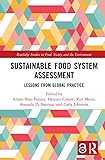Sustainable food system assessment : lessons from global practice / [edited by] Alison Blay-Palmer, Damien Conaré, Ken Meter, Amanda Di Battista,and Carla Johnston.
Material type: TextSeries: Routledge studies in food, society and the environmentPublisher: London ; New York : Routledge, Taylor & Francis Group, 2020Description: xvii, 263 pages : illustrations ; 24 cmContent type:
TextSeries: Routledge studies in food, society and the environmentPublisher: London ; New York : Routledge, Taylor & Francis Group, 2020Description: xvii, 263 pages : illustrations ; 24 cmContent type: - text
- computer
- online resource
- 9781138341951
- 338.1/9 23
- HD9000.5 .S83395 2020
| Item type | Current library | Call number | Status | Date due | Barcode | |
|---|---|---|---|---|---|---|
| E-Resources | Balanga Library E-Resources | 338.1/9 (Browse shelf(Opens below)) | Available | EBC00458 | ||
| E-Resources | Main Library E-Resources | 338.1/9 Su964 (Browse shelf(Opens below)) | Available | E001104 |
Browsing Main Library shelves, Shelving location: E-Resources Close shelf browser (Hides shelf browser)
Includes bibliographical references and index.
"Sustainable Food System Assessment provides both practical and theoretical insights about the growing interest in and response to measuring food system sustainability. Bringing together research from the Global North and South, this book shares lessons learned, explores intended and actual project outcomes, and highlights points of conceptual and methodological convergence. Interest in assessing food system sustainability is growing, as evidenced by the Milan Urban Food Policy Pact and the importance food-systems initiatives have taken in serving as a lever for attaining the UN Sustainable Development Goals. This book opens by looking at the conceptual considerations of food systems indicators, including the place-based dimensions of food systems indicators and how measurements are implicated in sense-making and visioning processes. Chapters in the second section cover operationalizing metrics, including the development of food systems indicator frameworks, degrees of indicator complexities, and practical constraints to assessment. The final section focuses on the outcomes of assessment projects, including impacts on food policy and communities involved, highlighting the importance of building connections between sustainable food systems initiatives. The global coverage and multi-scalar perspectives, including both conceptual and practical aspects, makes this a key resource for academics and practitioners across planning, geography, urban studies, food studies and research methods. It will also be of interest to government officials and those working within NGOs"-- Provided by publisher.
There are no comments on this title.








